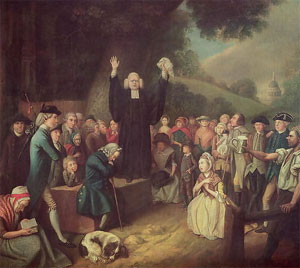
The Declaration of Independence
Lesson Plan
Religion, Tolerance, and Slavery

George Whitefield preaching
Many of the early colonies were founded because people were seeking religious freedom — Massachusetts, Connecticut, Rhode Island, Pennsylvania and Maryland all had those roots. Yet, even in the colonies, there were limits to the religious freedoms that were allowed. The groups settling in America were fleeing from painful memories of intolerance. Europe experienced over one hundred years of civil wars and unrest because of religious differences. As a reaction, the settlers in these colonies decided that an alliance between government and a single religion was the best way to promote individual morality, social harmony, and political stability. To the early colonists, allowing too much freedom to worship in different ways would bring about chaos.
Steadily, though, all that began to change. As new colonies formed, greater freedom to worship was added into many official charters and the most religiously strict colonies evolved to tolerate "dissenters". By the beginning of the 18th century, the situation had changed. Descendents of the initial settlers had not grown up under religious oppression, so the fiery religious spirit that led to the formation of the colonies went away. Communities were flourishing and the sense of distinct religious identity had diminished. The foundation of traditional religious beliefs was also under attack as rational thinking became more popular.
The reactions these circumstances led to the First Great Awakening. Tens of thousands of colonists who were not religious were converted or "revived" into various denominations of Christianity. Preachers such as George Whitefield inspired crowds of tens of thousands from Georgia to New England. The Great Awakening helped to churn up a desire for equality — spiritual equality. This desire, in turn, promoted the belief in political equality well before the First Continental Congress. It led to a tolerance of differences that had not occurred before and ultimately encouraged the Revolutionary spirit.
Despite the new focus on spiritual equality, one area was clearly left out of the Declaration: human equality. Among those left out were slaves, Native Americans and women. Why were they left out? What did the men in that Hall in Philadelphia in 1776 believe?
This section explores religion and its impact on the development of a new way of thinking. It examines why the founders did declare everyone in the colonies independence from Britain, while maintaining that all men were created equal in the signature document that would establish the basic tenants of the American Mind.
The above phrase, "descendants of the initial settlers had not grown up under religious oppression, communities flourished and the sense of distinct religious identity diminished" talks about how things can change from generation to generation. Can you think of parallel examples of this today?
Start page | The Document | A Reading | Signers | Related Information | Jefferson's Account | Declaration House | Declaration Timeline | Rev. War Timeline | More Resources | Lesson Plan |




